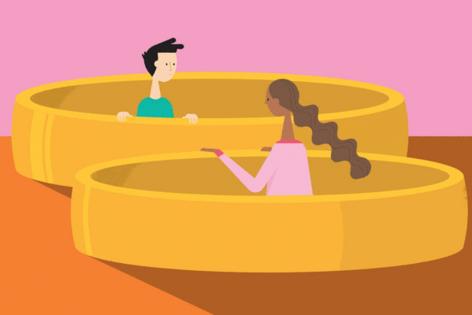Can straight married men and women be friends? I went on a quest to find out
Published in Dating Advice
Last fall I met a guy.
He had a thick mustache and was, by my estimate, at least 10 years my junior. We happened to sit next to each other at a dinner event at my social club. I'd recently watched "Wild Wild Country," a documentary series on a religious cult, and it was all I wanted to talk about. It turned out that he loved documentaries on religious cults too. Soon he was listing others I needed to see. We ended up discussing movies, Buddhism and his home state of Vermont for most of the night. He was funny, enthusiastic, friendly and smart. I felt lucky to have met him.
When the event wrapped up I thought about asking for his number — maybe we could get a drink sometime? But I decided against it. If he'd been a woman or gay I wouldn't have hesitated, but we are both in committed heterosexual relationships. I in a fulfilling marriage with my awesome husband, he in what seemed like a happy relationship with his girlfriend. I didn't want to date him, I just wanted to hang out again. But for two people in our situation, is pursuing an independent friendship even allowed?
I've always thought of myself as someone who seeks out male and female friends equally, but now that I'm a married mother in my 40s it seems this is no longer the case. In the last decade I've befriended hetero and queer women, gay men and non-binary folks. But with a few caveats, I haven't developed new friendships with straight guys. Had I unconsciously accepted the old adage from "When Harry Met Sally" that men and women can't be friends because "the sex part always gets in the way"?
After my encounter with the fellow religious cult documentary fan, I began to wonder how I got here and if I was the only married woman who felt this way. Was this evidence of my age, or an instinct that spanned generations? Surely our understanding of relationships has evolved since Meg Ryan faked an orgasm in Katz's Deli.
After talking with friends and strangers, therapists and a few professors, I've found that the answers to my questions vary wildly, depending on who you ask. And also: there is far more at play within platonic relationships than I'd ever thought.
"It's different for everyone," said Gaea Woods, a marriage and family therapist who practices in Los Feliz. "It's up to you to decide based on the relationship if it's appropriate or not."
Despite the impact that social connection has on our well-being, research on adult friendships is scant, and even harder to come by when considering friendships between men and women.
"We focused so long on romantic relationships to the exclusion of other relationships that we simply don't have basic data," said Jaimie Krems, a social psychologist at UCLA and director of the university's new Center for Friendship Research.
The few studies that do exist tend to look at male and female friends in their late teens and early 20s when researchers say opposite sex friendships are more common. But in my quest for answers, I did manage to find a study from 2012 published in the Journal of Social and Personal Relationship that included a survey of older adults in their 30s and 40s who were asked to list the benefits and challenges of having a friend of the opposite sex.
...continued
©2024 Los Angeles Times. Visit latimes.com. Distributed by Tribune Content Agency, LLC.







Comments